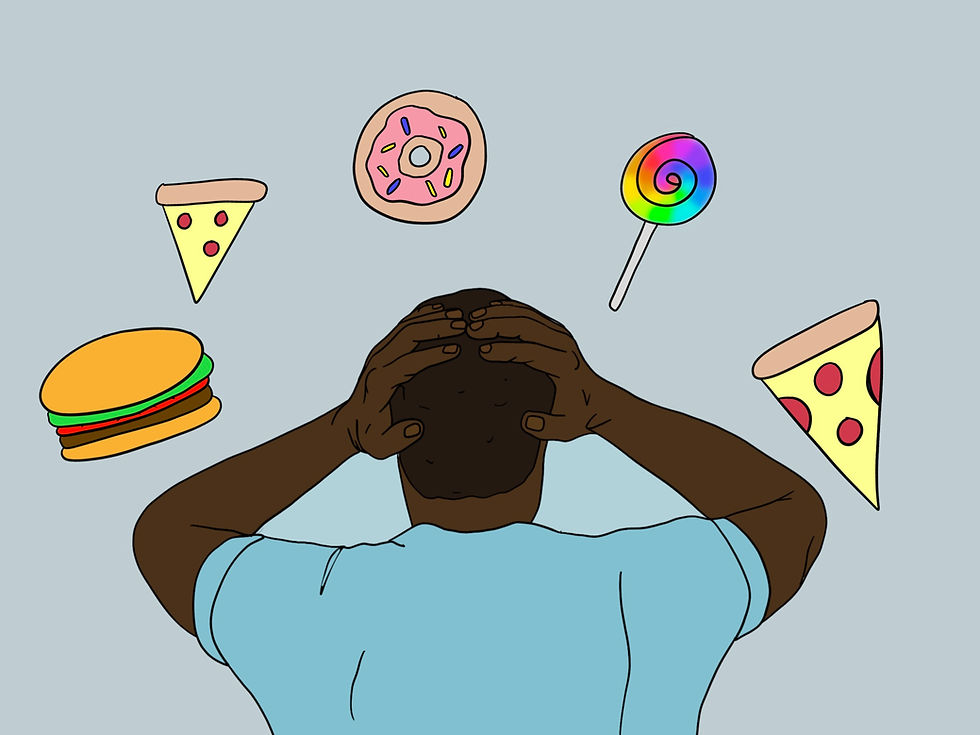What is Eating Disorders?
- Science Holic
- Dec 31, 2020
- 3 min read
Author: Karen Liu
Editors: Shannon Tan and Kira Tian
Artist: Denise Suarez
Eating disorders are illnesses characterized by irregular eating behaviors and severe concern about food and body weight. There are many myths and stereotypes surrounding eating disorders that oversimplify how serious and sometimes fatal it can be. So what exactly goes on at the psychological level of someone with an eating disorder?
There are many types of eating disorders, but the most common include anorexia nervosa, bulimia nervosa, and binge-eating disorder.
Anorexia is marked by an obsessive fear of gaining weight, refusal to maintain a healthy body weight, and an unrealistic perception of body image. Many people with anorexia view themselves as overweight when in reality they are severely underweight. Therefore, they strictly limit the amount of food they consume, which can be fatal. Anorexia can lead to brain damage, organ failure, bone loss, heart difficulties, infertility, and even death.

Bulimia is characterized by something known as binging and purging. It starts with binge eating, followed by behaviors that compensate for all of the overeating. This can include: vomiting, over-exercising, or overuse of laxatives or diuretics. Many people with bulimia are unhappy with their body image and they tend to repeat this cycle in secret. This creates feelings of guilt and shame, but they can’t seem to stop. Bulimia can lead to gastrointestinal problems, severe dehydration, and heart difficulties resulting from an electrolyte imbalance.
Finally, binge-eating disorder is just marked by severe overeating of food. Unlike bulimia though, it isn’t followed by purging behaviors. Therefore, someone with binge-eating disorder tend to be overweight or obese compared to the other two. Many people who have binge-eating disorder feel guilty and embarrassed, and in order to deal with those feelings, they eat. Therefore, this cycle keeps repeating. Binge-eating disorder can lead to cardiovascular disease.
With all this being said, what causes all of these eating disorders? The exact cause is unknown, there are a variety of biological and psychological factors that play a big role in influencing people to develop these diseases. Causes include genetics, poor mental health, negative body image, and poor self-esteem.

Recently, genetics and eating disorders have been heavily researched and it has been shown that there is a connection. A study by the Michigan State University looked at 500 14-year-old twin females and found that prior to puberty, environmental factors heavily influenced the development of eating disorders, but post-puberty, there was a 50% genetic reason for eating disorder emergence. Research also showed that certain chromosomes held genes that appeared to be significantly linked to anorexia and bulimia. Researchers believe that the pathway where the genes were found increases a person’s desire for food when they have an increased need for calories. However, when the genes are mutated, they can restrict a person’s ability to want to eat. Research has also found thought individuals with those mutated genes will not show symptoms when they are young.

There are also environmental factors that increase the risk factors of getting eating disorders. For instance, society and culture can influence our eating behaviors as well as our understanding of an ideal body shape. Additionally, media, peer, and parental messages can contribute to how we perceive our own bodies. Especially in this day and age, the media often portrays an unrealistic standard of slender models, making many young people feel worse about their own bodies. Low self-esteem and negative body image can put many people through intensive routines to lose weight, leading to eating disorders. Finally, traumatic events can trigger eating disorders as well. Many who are sexually abused or grew up in an abusive family tend to find comfort in food. However, neither nature nor nurture are the sole cause of eating disorders. A complicated cascade of these events will most likely slowly develop into an eating disorder.
Citations:
“Eating Disorders.” National Institute of Mental Health, U.S. Department of Health and
Human Services, www.nimh.nih.gov/health/topics/eating-disorders/index.shtml.
“Eating Disorders: Symptoms, Signs, Causes & Articles For Treatment Help.” Eating
Disorder Hope, 8 Oct. 2020, www.eatingdisorderhope.com/information/eating-disorder.
Lauren Muhlheim, PsyD. “Why Do Some People Get Eating Disorders?” Verywell Mind,
www.verywellmind.com/what-causes-eating-disorders-4121047.
McGuire, Jane, and Jane McGuire. “Genetic Factors Behind Eating Disorders.” Eating
Disorder Hope, 9 Oct. 2017, www.eatingdisorderhope.com/blog/genetic-factors-eating-
disorders.
Parekh M.D., M.P.H., Ranna. What Are Eating Disorders?, 2017,
www.psychiatry.org/patients-families/eating-disorders/what-are-eating-disorders.
Susan Cowden, MS. “Is the Media to Blame for Causing Eating Disorders?” Verywell Mind,
17 Sept. 2020, www.verywellmind.com/media-influence-on-disordered-eating-1138266.



Comments